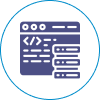Full-stack PHP developers are in high demand in India's diverse industries because of their adaptable web
development abilities. These developers are in high demand in the following notable industries:
To create and manage reliable e-commerce websites, businesses running online retail
platforms need full-stack PHP developers. Examples of such platforms are Flipkart, Amazon India, and
Snapdeal.
Full-stack PHP developers are employed by software development companies and IT
service providers in India to work on custom software solutions for customers in a range of
industries.
To create safe and scalable web applications for online banking, payment gateways,
and financial management systems, banks, financial institutions, and fintech businesses work with
PHP developers.
PHP developers are employed by healthcare organizations and telemedicine platforms
to create and administer electronic health records (EHRs), medical scheduling apps, and patient
management systems.
Learning management systems (LMS), student portals, and educational content
management platforms are created and maintained by PHP developers for use in educational
institutions and e-learning platforms.
PHP developers are used by travel companies, hotel chains, and online booking
platforms to create and improve reservation platforms, booking systems, and customer management
tools.
PHP developers are employed by media organizations, entertainment businesses, and
digital content platforms to create streaming services, multimedia platforms, and content management
systems (CMS).
PHP developers are frequently sought after by automotive startups and firms that
specialize in fleet tracking, vehicle management systems, and automotive e-commerce platforms.
Property listing websites, real estate portals, and CRM systems for client
relationship management are all made by real estate firms and property management companies using
PHP developers.
PHP developers are also employed by manufacturing organizations that need web-based
solutions for inventory monitoring, supply chain management, and production scheduling.
Exclusive list of Interview Questions asked when you Full-Stack PHP Developers in India
PHP Fundamentals:
What is PHP?
PHP is a server-side scripting language designed for web development but also used as a general-purpose
programming language.
What are the differences between PHP constants and variables?
Constants are defined using the define() function and cannot be changed once defined. Variables are assigned
using the $ symbol and their value can vary.
Explain the difference between echo and print in PHP.
Both echo and print are used to output data to the screen in PHP. echo can take multiple parameters, has no
return value, and is faster. print can only output one string, returns 1, and is slower.
How do you escape data before storing it in a database to prevent SQL injection?
Use prepared statements with parameterized queries (e.g., using PDO or mysqli), which automatically escapes data
and prevents SQL injection attacks.
What are namespaces in PHP? Why are they used?
Namespaces are a way to organize code into logical groups and prevent naming collisions between classes,
functions, and constants. They improve code readability and maintainability.
Object-Oriented PHP:
What is inheritance in PHP?
Inheritance allows a class to inherit properties and methods from another class. It promotes code reusability
and is implemented using the extends keyword.
What is method overriding in PHP?
Method overriding is when a subclass provides a specific implementation of a method that is already defined in
its superclass. It allows for polymorphism.
What are abstract classes and interfaces?
Abstract classes cannot be instantiated and can contain abstract methods (methods without a body). Interfaces
are similar but can only contain method signatures and constants. Classes can implement multiple interfaces but
inherit from only one class (abstract or concrete).
Frontend Technologies:
Explain the importance of AJAX in web development.
AJAX (Asynchronous JavaScript and XML) allows web pages to be updated asynchronously by exchanging small amounts
of data with the server behind the scenes. It improves user experience by making pages more dynamic and
responsive.
Database Interaction:
What is the difference between mysql_connect(), mysql_pconnect(), mysqli_connect(), and mysqli_pconnect()?
mysql_connect() and mysql_pconnect() are deprecated functions in PHP for connecting to MySQL databases.
mysqli_connect() and mysqli_pconnect() are their improved counterparts that support MySQLi (MySQL Improved)
functions and provide better security and performance.
Security and Performance:
What are some common security issues in PHP and how do you mitigate them?
Common security issues include SQL injection, cross-site scripting (XSS), and cross-site request forgery (CSRF).
Mitigation techniques include using prepared statements, validating input data, and implementing CSRF tokens.
How do you optimize the performance of a PHP application?
Performance optimization techniques include caching (e.g., using Memcached or Redis), optimizing database
queries, minimizing file includes, enabling gzip compression, using a content delivery network (CDN), and using
efficient algorithms and data structures.
General Development Practices:
Describe a PHP project you've worked on. What was your role and what challenges did you face?
Provide a brief overview of a PHP project you've contributed to, highlighting your specific role (e.g., backend
development, database design) and any challenges you encountered (e.g., scalability issues, integrating
third-party APIs).
Frequently Asked Questions
What is PHP, and how does it benefit web developers?
PHP is a scripting language that runs on servers and is mostly used for web development. Its benefits include
extensive platform support, a sizable developer community, and simplicity of interface with databases such as
MySQL.
In PHP, distinguish between require, require_once, include, and include_once.
The following PHP directives are used in scripts to include external files:
include: During runtime, includes and assesses a given file.
include_once: In order to avoid repetition, include_once ensures that the file is included just
once, similar to include.
require: Stops the script if the supplied file cannot be found and includes and evaluates it
during execution.
require_once: require_once guarantees that the file is included just once, similar to require.
Describe the PHP session notion. What distinguishes them from cookies?
With PHP sessions, you can save user data for later use on the server. These sessions are identifiable by a
session ID that is kept on the client side (typically in a cookie). Conversely, cookies are client-side data
files that are accessible and modifiable by both the client and the server.
What are superglobals in PHP? List a few superglobals that are frequently used as examples.
Superglobals are pre-built variables found in PHP scripts that are always accessible:
$_GET: Retrieves information from the URL or query string.
$_POST: Data is retrieved via the HTTP POST method.
$_SESSION: Session variables are accessed via $_SESSION.
$_SERVER: Holds details about the server and the execution environment.
$_COOKIE: Allows access to client-sent cookies.
$_FILES: Handles HTTP POST file uploads.
$_ENV: Environment variables are retrieved using $_ENV.
In PHP, how are file uploads handled?
The move_uploaded_file() function and the $_FILES superglobal are used to handle file uploads. Assure
appropriate security measures (e.g., renaming files, storing files in a secure directory) and validation (e.g.,
file type, size).
Describe SQL injection and how PHP applications might avoid it.
SQL injection involves inserting malicious SQL statements into input fields to manipulate a database. To avoid
it, use prepared statements and parameterized queries with PDO (PHP Data Objects) or MySQLi extensions instead
of directly integrating user input into SQL queries.
In PHP, what are namespaces? How do they aid in the structuring of code?
Namespaces allow you to group PHP classes, functions, and constants logically to prevent naming conflicts. They
improve code readability, maintainability, and facilitate class autoloading.
Explain how PHP frameworks leverage the Model-View-Controller (MVC) architecture.
MVC divides an application into three interconnected components:
Model: Represents data and business logic.
View: Provides users with a presentation layer to render.
Controller: Chooses which views to render, responds to user requests, and communicates with the
model. PHP frameworks like Symfony, CodeIgniter, and Laravel utilize MVC to organize applications.
How may a PHP application's performance be improved?
Techniques for performance optimization include:
- Caching (with programs like Redis or Memcached).
- Cutting down on pointless code execution and minimizing file inclusions.
- Optimizing database queries (avoid N+1 query problem by using indexes).
- Turning on opcode caching (APC, OPcache, etc.).
- Employing the Content Delivery Network (CDN) and asynchronous processing for static content.
Describe the PHP notion of dependency injection. Why is it advantageous?
Dependency injection (DI) involves injecting or passing an object's dependencies rather than having the entity
create them on its own. It increases code reusability and maintainability, encourages loose coupling, and makes
unit testing easier.


































